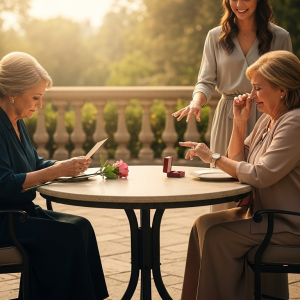“Can you even afford to eat here?”
The words, sharp and cold, sliced through the warm ambiance of the dining room. My sister, Heather, delivered them with a practiced smirk, a casual execution she’d perfected over a lifetime. Before I could answer, Marcus, my most trusted server, glided to our table, his expression a perfect mask of professional calm. He addressed me, and only me.
“Welcome back, Miss Dara,” he said, his voice a low, respectful murmur. “Your usual table is prepared for your meeting with the investors. Shall I handle… the situation here?”
My father’s hand, midway to lifting his wine glass, froze. He nearly choked on the vintage Bordeaux he had just declared “adequate.”
It all began five years ago when I walked away from the life they had meticulously designed for me. In Greenwich, Connecticut, being a Mitchell wasn’t just about wealth; it was a legacy etched in mahogany and old money. My parents, Richard and Margaret, saw their children as extensions of their own ambition. Heather was the future Yale Law graduate. Ethan, the mathematical prodigy destined for investment banking. And I, Dara, was the “creative,” a euphemism for the family’s greatest disappointment.
My sanctuary was the kitchen, a world away from the sterile perfection of our colonial home. It was there, under the gentle mentorship of our Greek housekeeper, Elena, that I found my language. “You have the hands for this, agápi mou,” she’d say, watching me knead dough with a focus I never applied to my studies. “You understand food in your soul.”
The declaration of my intent to attend culinary school was met with glacial disdain. “Cooking is what our people hire others to do,” my father had stated, his voice a quiet blade. “Mitchells do not become the help.”
To appease them, I enrolled at Dartmouth for a business degree, a path trod by my father and grandfather. But I lived a double life, running an underground supper club from my apartment to secretly fund weekend workshops with local chefs. The turning point came when Chef Laurent Pirot, a culinary demigod with three Michelin stars, tasted a sauce I’d made for a university function. He pulled me aside, his eyes intense.
“Who taught you to build flavor like this?” he demanded. “I taught myself,” I whispered. He handed me his card. “You are wasting your soul in this place. Come to my kitchen in New York. I will make you a warrior.”
Two weeks later, I stood in my parents’ living room and announced I was dropping out of my MBA program. The silence was a physical weight.
“This is an act of profound disrespect,” my father finally said. “No,” I countered, my voice trembling but firm. “Respect is the one thing you never invested in me.” My mother’s face hardened into a marble mask. “If you pursue this… hobby… you do so without our support. Financial or otherwise.” Heather, home from law school, let out a chilling laugh. “Let’s see how long the prodigal daughter lasts on a line cook’s salary.”
I left that night with a single suitcase and my savings. The next five years were a forge. Eighteen-hour days in blistering kitchens, living in a cramped Queens apartment with three roommates, and a mountain of student loans. But under Chef Laurent’s brutal tutelage, I didn’t just survive; I thrived. The kitchen’s violent, chaotic ballet became my peace.
Two years ago, an investor who had followed my career approached me. Maison opened its doors with me as Executive Chef and partial owner. Within a year, using the business acumen my father never thought I’d apply, I secured a loan and bought out my partners. I was the sole proprietor.
I kept my success a secret. I wanted it on my own terms, not as a peace offering to finally earn their approval. So when the embossed invitation to Heather’s engagement dinner arrived, addressed to my humble apartment, I was stunned. The location? My own restaurant. A place they’d chosen purely for its status, a perfect backdrop for their performance.
After days of deliberation, I accepted. I had to know. After five years, had anything changed?
As I pushed open the heavy glass doors of Maison tonight, ready to play the struggling black sheep one last time, the familiar scent of saffron and reduced wine wrapped around me. Usually, it was a comfort. Tonight, it felt like the prelude to a war.
My family had claimed the center table, a throne room for the evening’s proceedings. My mother, encased in Chanel, was performing a quick, dismissive scan of my appearance—a simple black dress they couldn’t possibly know was Diane von Furstenberg.
“Dara, you finally arrived,” she said, offering a cheek for an air-kiss. “We were beginning to think you’d gotten lost.” “I’m precisely on time, Mother,” I replied, my voice even.
My father’s hug was stiff, an awkward pat on the back. “You look… healthy,” he offered, the Mitchell family code for “overweight.”
Heather introduced her fiancé, Bradley, who recited his pedigree instead of a greeting: “Princeton undergrad, Wharton MBA. Just made junior partner at Goldman.” He was a perfect match for my family’s love language: credentials and status.
As I took my seat, I watched my staff’s subtle reactions. Jose, my sommelier whom I’d personally poached from a three-star restaurant in Paris, caught my eye as he approached with the champagne my father had ordered—the most expensive, of course. A flicker in his eyes asked for direction. I gave an imperceptible shake of my head.
“An excellent choice,” Jose said to my father, his voice smooth as silk.
“I’m surprised you managed a reservation,” I said, a hint of innocence in my tone. “I hear it’s nearly impossible.” Bradley leaned in, smug. “I know people. Called in a favor.”
The first offering from the kitchen arrived: an amuse-bouche, a single, perfect sphere of compressed watermelon with fermented black garlic. “Is this it?” Heather asked, eyeing the small bite with disdain. “I’m famished.” “It’s a palate opener,” I explained. “I know what an amuse-bouche is, Dara,” she snapped. “I’m not a barbarian just because I chose a real career.”
She left hers untouched. “I don’t do raw garlic,” she declared, oblivious that the garlic had been painstakingly fermented for sixty days to achieve its sweet, mellow flavor. I saw the flash of disappointment in our server Jessica’s eyes. In that moment, I felt a surge of protectiveness—not for myself, but for my team, for the family I had built here.
The interrogation began, couched in feigned concern. “What exactly is it you do?” Bradley asked. “Line cook, catering… I’ve worn many hats,” I answered vaguely. “Well, we’re just glad you’re managing to support yourself,” my mother said, the faux graciousness like sandpaper on my nerves.
The next course arrived: seared scallops with a brown butter emulsion. “Decent wine list here,” Bradley announced to the table, swirling a Sancerre I had personally selected to pair with the dish. “Not exceptional, but passable.” Jose, passing by, shot me a look of pure comic disbelief.
The conversation turned to me again. Heather led the charge, her tone dripping with condescension. “So, how exactly are you affording a place like this on a food service salary? A dinner here costs more than you probably make in a week.” Her eyes narrowed. “Who are you dating? Is he paying for this?”
The next course arrived: duck breast, cooked to a perfect medium-rare, its skin rendered impossibly crisp. “This duck is undercooked,” Bradley declared after one bite. “It’s raw. Take it back and cook it properly.” I saw Jessica clench her jaw for a fraction of a second before her professional mask slipped back on. “Of course, sir.” I gave her a slight nod. She knew to have the kitchen fire a new one, rather than desecrating the original. When it returned, Bradley chewed on what I knew was now a dry, gray insult to the bird. “Much better,” he proclaimed.
The tension was a tangible thing, a guest at our table. “You still haven’t answered, Dara,” Heather pressed, her voice like chipping ice. “How can you possibly afford this? Are you in debt? Maxing out credit cards to keep up appearances?” “Heather,” Ethan warned, a rare note of discomfort in his voice. “No, I want to know,” she insisted, her voice rising. “We’ve all spent this evening pretending it’s fine that she threw her life away. I think we deserve some honesty.”
The moment arrived with the check. Marcus placed the black leather folder in the center of the table. Bradley, ever the peacock, snatched it before my father could. “Please, Richard. My treat.”
He opened the folder. I watched the confident smile drain from his face, replaced by a flicker of pure shock. The bill, with their premium wines and off-menu requests, was well over three thousand dollars. He fumbled for his black card, the bravado gone.
Heather, sensing his discomfort, moved in for the kill. “So, Dara,” she cooed, her voice dripping with false sweetness. “You never did tell us. We wouldn’t want you stretching yourself on our account.” She leaned forward, her eyes glinting. “Can you even afford to eat here?”
The question hung in the air, a deliberate, public humiliation. Before I could answer, Bradley frowned at the bill. “Wait a minute. There’s a mistake. They’ve only charged us for the wine.”
He signaled sharply for Marcus. “Excuse me, your check is wrong.” This was it. The moment of truth. Marcus approached, his timing impeccable. “Is there a problem, sir?” “Yes. You forgot to charge us for the meal,” Bradley said, pointing.
Marcus glanced at the bill, then looked directly at me. In that split second, I gave him the nod. The charade was over.
“There’s no error, sir,” Marcus said smoothly, his gaze never leaving me. “The dinner has been taken care of.” “By whom?” my father demanded.
Marcus’s professional demeanor finally broke, replaced by a warm, genuine smile. He turned his body fully toward me, a gesture of deference that silenced the table.
“Welcome back, Miss Dara,” he said, his voice clear and resonant. “Your usual table is prepared for your meeting with the investors. Shall I handle the situation here?”
The silence was absolute, a vacuum where six different realities were shattering at once. “Thank you, Marcus,” I said, my voice steady despite the thunder in my chest. “Please close out Mr. Harrington’s beverage tab. The rest is on the house.”
“Very good, Miss Dara,” he replied, taking the folder from Bradley’s slack-jawed grip. “Chef Miranda would also like your opinion on the new spring menu when you have a moment.” “I’ll stop by the kitchen before my meeting,” I assured him.
As Marcus walked away, I met the stunned, uncomprehending eyes of my family. “What… what is happening?” my mother stammered.
I took a slow, deliberate sip of water. “Welcome to Maison,” I said, my voice calm and clear. “My restaurant.”
The confession hung in the air for a moment before Heather blurted out, “That’s impossible!” “Is it?” I countered. “Food & Wine last month. Bon Appétit before that. Four stars from the Times last year.”
My mother’s hand fluttered to her pearls, her telltale sign of social destabilization. “Darling, why wouldn’t you tell us?” “Because I wanted to see who I was to you without the status,” I said, my gaze sweeping across each of their faces. “And tonight, you showed me.”
I told them everything. The three jobs, the four hours of sleep a night, the burns that scarred my arms. I told them about James Warren, the investor who discovered me. I told them about the $3.4 million initial investment, and how I bought out my partners a year ago.
“So that’s why you suggested this place,” Heather said, her voice barely a whisper. “Actually, no,” I corrected. “Allison chose it. As the most impressive new restaurant in the city. Isn’t that right, Allison?” My sister-in-law blushed, nodding mutely.
At that moment, my Chef de Cuisine, Miranda Torres, approached in her crisp whites. “Sorry to interrupt, Dara, but the Matsuhisa party is here, and your publisher called about the cookbook cover.” “Cookbook?” Heather echoed, her face pale. “Coming out this fall,” I confirmed.
My father, ever the pragmatist, finally spoke. “You’ve clearly inherited my business sense.” The audacity of it made me laugh, a sharp, humorless sound. “I built this without your connections, without your money, and without your approval. This is mine.”
Bradley, seeing a new angle, suddenly perked up. “A restaurant group? Expansion? I have contacts…” I held up a hand. “I’m not looking for investors, Bradley. Especially not tonight.”
I rose from my seat. “I have a business to run. Thank you for coming.” “Dara, wait,” my mother pleaded. “Don’t leave like this. We should celebrate!” “Celebrate what?” I asked. “My success? Or the fact that I’m no longer a social embarrassment to you?”
Ethan stood, his expression one of genuine remorse. “Dara… for what it’s worth… this is incredible. I’m sorry.” His was the only apology that felt real. I gave him a small nod and turned to walk away, leaving them sitting in the ruins of their own judgment, in the heart of the kingdom I had built from ash.
I had barely reached the bar when my mother hurried after me, her composure cracking. “Dara, please. You can’t just walk away.” “I have a meeting, Mother,” I said calmly. “My business doesn’t stop because you’ve suddenly decided my career is valid.”
My father approached, slipping into his familiar role as the problem-solver. “Perhaps we could continue this tomorrow. Dinner at our place.” “I don’t think so,” I said. “Tonight has made one thing clear. If we’re going to have a relationship, it will be on new terms. I am not the family failure seeking redemption. I am a business owner who deserves your respect.”
A heavy silence fell. It was my father who broke it, his voice rough with an emotion I couldn’t identify. “You’re right. We should have supported your passion regardless of the outcome.”
The admission stunned me more than anything else that night. “What about the wedding?” Heather asked quietly, stepping forward. “I’d still like you to be there. As my sister.”
I looked at her, seeing past the years of rivalry to the little girl I once shared secrets with. “I’ll be there,” I said. Then, a thought took shape. “And as my gift, I would like to host the rehearsal dinner here. At Maison.” Her eyes widened with tears. “You’d do that? After everything?” “You’re still my sister,” I said. “But this is an offer from me, on my terms. Not an attempt to buy my way back into your good graces.” “I understand,” she whispered. “And I would be honored.”
I finally turned to leave. “I have investors waiting. But I’m free for brunch on Sunday. There’s a small place in the East Village I think you should all experience.” “We’ll be there,” my mother promised, a note of hope in her voice.
As they filed out into the night, I let out a breath I didn’t realize I’d been holding for five years. Miranda appeared at my side. “Everything okay, Chef?” “Getting there,” I smiled. “Family is… complicated.” “Tell me about it,” she laughed. “Now, let’s go talk about that spring menu. I have ideas.”
As we walked toward the kitchen—my sanctuary, my home—I realized the most important victory tonight wasn’t revealing my success to them. It was finally, fully, recognizing it for myself. I had built a life on my own terms, and that was a flavor more satisfying than any approval they could ever offer.




